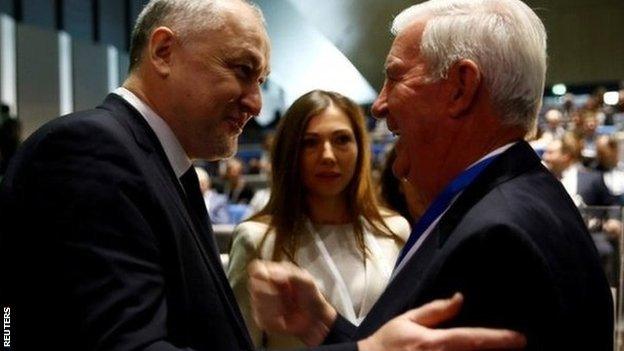Russian doping: Rusada chief appeals to President Vladimir Putin for 'urgent resolution'
- Published

Rusada director general Yuri Ganus with Wada president Craig Reedie
Russia's anti-doping agency has appealed to President Vladimir Putin to help them avoid being suspended again by the World Anti-Doping Agency.
A Wada inspection team was denied full access to a Moscow anti-doping laboratory last week.
Russia must transfer athletes' sample data by 31 December or risk being banned once again from international events.
"We are at the edge of the abyss," said Rusada chief Yuri Ganus., external
Addressing Putin, he added: "I ask you to protect the present and future of our fair sport, present and future generations of athletes."
Wada lifted a three-year ban on Rusada in September which followed a major scandal over state-sponsored doping.
The decision provoked an outcry but Wada president Sir Craig Reedie defended the move and said the reinstatement was "subject to strict conditions", including access to the Moscow laboratory data and samples before the end of 2018.
However, a team of five experts were unable to complete their mission to extract the data on 21 December because Russian authorities raised an issue that "the team's equipment to be used for the data extraction was required to be certified under Russian law".
Ganus said the situation "requires urgent resolution" in calling on Putin to intervene.
"Trust is very difficult to regain when the ghosts of the past deter us from moving forward," he said.
"The question is not how many positive samples will be found in the Moscow laboratory, but what we will do with this.
"After all, obstruction in the investigation of the Moscow laboratory database, whether we like it or not, indicates the interest of persons who impede the investigation, the transfer of data and samples."
Ganus added that "self-isolation is disadvantageous to Russia" and that the country "deserves to be fully represented in the international sports arena".
"We need victories in sports, victories that no one will take away from us," he said.
After the team were denied full access, Wada said a report would be sent to the independent Compliance Review Committee (CRC). The CRC will meet on 14-15 January 2019 when Rusada's "compliance status" will again be considered.
The CRC's recommendation will then be considered by the Wada executive committee.
How the scandal unfolded
December 2014: As many as 99% of Russian athletes are guilty of doping, a German TV documentary alleges.
November 2015: A Wada commission publishes an independent report alleging widespread corruption, amounting to state-sponsored doping in Russian track and field athletics. Rusada is declared non-compliant.
May 2016: Former Moscow anti-doping laboratory boss Grigory Rodchenkov,, external who has turned whistleblower, says dozens of Russian athletes at the 2014 Winter Olympics in Sochi had cheated.
July 2016: Russia operated a state-sponsored doping programme for four years across the "vast majority" of summer and winter Olympic sports, says a report from Professor Richard McLaren.
August 2016: International Olympic Committee (IOC) decides against imposing a blanket ban on Russian athletes at the 2016 Olympics in Rio. Individual sporting federations rule instead, with 271 Russians competing.
December 2016: Wada publishes the second part of the McLaren report which says more than 1,000 Russian athletes benefited from doping.
January 2017: Rusada and Russian sport authorities given list of criteria, external to achieve before winning back recognition.
March 2017: Wada says Russia's anti-doping reforms are not happening quickly enough.
February 2018: Russia are banned from competing at 2018 Winter Olympics in South Korea by the IOC, but 169 athletes who prove they are clean allowed to compete under a neutral flag.
May 2018: Wada writes to Rusada offering 'compromise' solution.
September 2018: News of the compromise, revealed by the BBC, prompts fury from athletes and doping bodies.